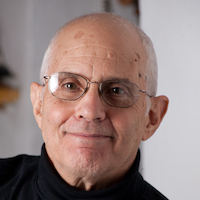It’s not very often that you’re watching a major feature film and hear the name Alan Watts.
But there it is, not in some obscure indie flick, but in Her, which was nominated for five Academy Awards and won Best Original Screenplay honors for writer-director Spike Jonze (who also won Golden Globe and Writers Guild of America awards). And not just tossed out by some incidental character, but cited reverentially at a key moment in the story by the seductive voice of Scarlett Johansson as Samantha, the self-evolving operating system/lover of Joaquin Phoenix‘s Theodore Twombly, and waxing philosophical digitally (voiced by Brian Cox, in a reasonable facsimile of Watts’s erudite British accent).
For those of us whose eager young minds were blown by Alan Watts’s books and media appearances, and whose intellectual hunger was fed by his lucid interpretations of Eastern philosophy, his presence in the film was as satisfying as it was surprising.
For those who don’t know Alan Watts from Alan Greenspan, here is a primer.
Born in 1915, Watts was a spiritually inclined teenager in his native England. Finding ordinary religion “grim and maudlin,” he was drawn to the mystical traditions. But not for him the mysticism of austerity and renunciation. His was a heady, robust, world-affirming mysticism. He dove into Buddhism so deeply that he became secretary of the London Buddhist Lodge at age 16 and published his first book, The Spirit of Zen, at 21 (two decades later, he would pronounce that work “unscholarly” and “misleading” and update his thinking in his classic, The Way of Zen.
In 1938, at 23, Watts moved to New York (he would eventually become an American citizen) and took up formal Zen training. He eventually abandoned that pursuit, but the urge for religious credentials remained. He was ordained an Episcopal priest in 1945, serving for five years as a chaplain at Northwestern University before that too wore thin. He gave up the priesthood, and in 1951, his life–and, subsequently, millions of other lives—changed radically when he was invited to join the faculty of the nascent American Academy of Asian Studies (AAAS) in San Francisco.
By the Bay, Watts blossomed into a learned, lucid, witty and irreverent interpreter of Eastern philosophy—not just Buddhism, but also Taoism and Hinduism–and became a counterculture icon. The hugely popular courses and seminars he other AAAS teachers conducted were intellectual fuel for what came to be called the San Francisco Renaissance. Among the regulars in attendance were the beat poets of North Beach, some of whom—most notably, Allen Ginsberg and Gary Snyder—famously spiced their verse with hip Asian flavors.
In the ensuing period of cultural upheaval, Watts did more than any other public thinker to make the wisdom of the Eastern sages comprehensible to English-speaking seekers. His numerous books, articles, lectures, and radio and TV shows reached far beyond the avant-garde, and they kept on reaching people long past his death in 1973. I interviewed over 300 people for my book, American Veda, and Alan Watts’s works were cited as vital influences more often than those of any other Western author.
I suspect that Watts would love the idea of facilitating a plot twist in a movie as offbeat as Her, and that he would relish Spike Jonze’s blend of science fiction, Hollywood romance, and cosmic consciousness. I’m sure he would love the Zennish play of mind-boggling ideas, like an operating system whose consciousness evolves in accord with the yogic template he elucidated so well.
As for Samantha’s remark that not having a body has distinct advantages?
He’d think it was a hoot. After all, he specialized in playing with the paradoxes of Eastern spirituality, like being told to transcend our bodily identities to realize the infinite Self, while also cherishing our embodiment and enjoying the pleasures of the senses—as the roguish Watts emphatically did in his Sausalito houseboat and Esalenhot tubs and bomehian enclaves everywhere.
Perhaps his cameo appearance in a hit movie will bring Watts’s wit and wisdom to the attention of a new generation of philosophical adventurers, meditators, yogis, and consciousness explorers. His books, audios and videos are as relevant now as they were decades ago, and most of his body of work is still available through the usual sources and the website devoted to his life and work. If he is rediscovered four decades after his passing, it would be a well-deserved resurrection. He would probably light up a cigar and have a good long laugh.
Love elephant and want to go steady?
Sign up for our (curated) daily and weekly newsletters!
Editor: Renée Picard

 Share on bsky
Share on bsky







Read 1 comment and reply